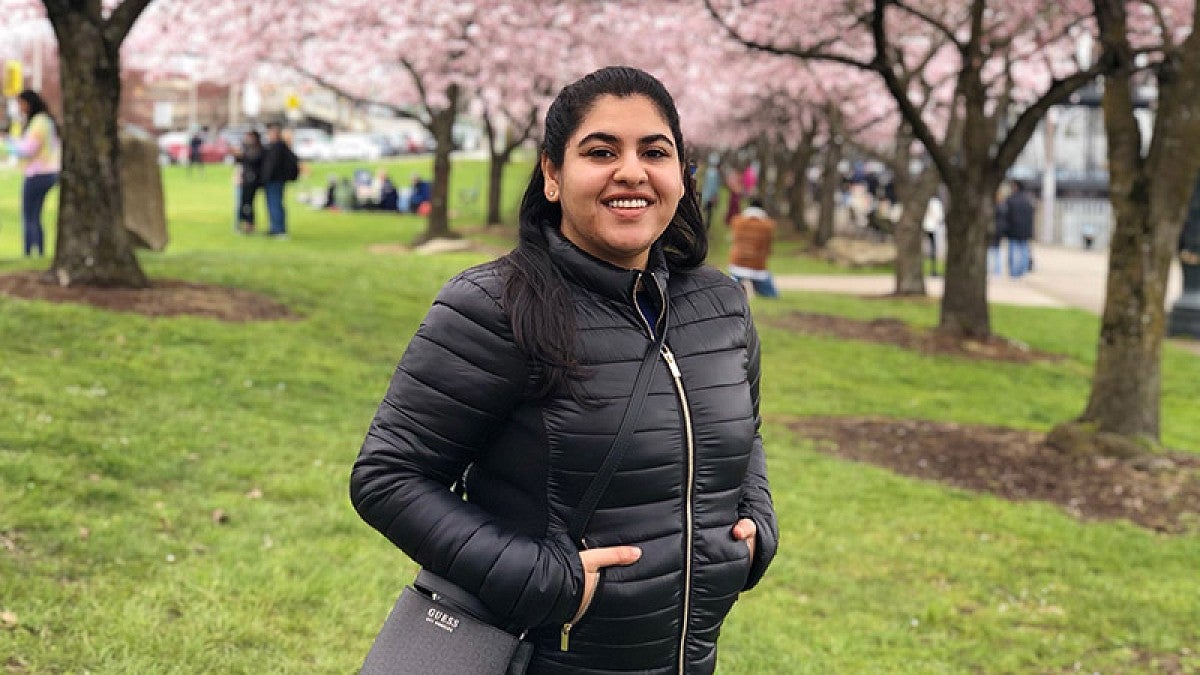A new study at the University of Oregon is seeking to better understand the impact of COVID-19 on the South Asian immigrant community. Aakanksha Lahoti, a second year PhD student in UO’s Counseling Psychology program, wants to answer questions related to the experience of diasporic bereavement among families spread across Asia and North America.
Her current research investigates the socioemotional impact of the pandemic on the South Asian Indian population in North America to better understand how they experience pandemic-related distress. Lahoti is interested in the consequences of transnational bereavement and COVID-19 travel bans on the South Asian community. She hopes to highlight areas of focus for public policy and social projects in the future.
“My research project essentially came out of the helplessness I felt sitting here in the US during the pandemic and passively experiencing everything, from grief to anger,” Lahoti said. “It’s a project that I wish didn’t have to exist, because it came at the cost of so much pain for everyone. But at the same time, these experiences need to be represented because they respond to events that have never happened before in human history.”
Lahoti’s experience with trauma-related research motivated her decision to pursue a PhD at the University of Oregon. Prior to joining the program, she had received master’s degrees in professional counseling and counseling and mental health services from the University of Pennsylvania and been trained as a trauma therapist. Her research interests explore the mental health experiences of immigrant populations, including experiences of trauma, transnational separation, bicultural identity integration, and cultural influences on development and sexual expression.
In researching the repercussions of the pandemic in South Asian diasporic communities, Lahoti hopes to bring untold stories to light. Her study addresses important questions like: What does grief look like from afar? How does bereavement transcend geographical boundaries?
As a South Asian woman, this project is as personal as it is timely. The rise of COVID-19 cases in India last spring underscored the salience and urgency of this pandemic for her and her family. Lahoti recalls sitting in her home, hearing news reports, and getting phone calls about loved ones who were thousands of miles away.
“While that was happening, it felt like the grief process was ongoing, but also never-ending and thus cyclical,” Lahoti explained. “Someone would die, we began grieving for that person, and then someone else would die and the grief process would repeat and start all over again, but also continue for those we were still grieving. That was very common for a lot of people I was talking to in the US.”
Lahoti’s project also examines the idea of bicultural identity integration, which shows how immigrant communities incorporate more Americanized elements into the culture they have from their country of origin. If the two can be successfully integrated, better psychological outcomes will emerge as a result. Lahoti is attempting to see how identity development, social support, and discrimination play a role in that cultural construction.
“This is my community,” says Lahoti. “I want to ensure that their voices are represented in my field, because no one else is better suited to do it other than people from the community.”
Lahoti hopes that this study will help researchers gain a more refined understanding of the South Asian immigrant and refugee community. The results of this research could also spark other efforts to investigate the impact of COVID-19 on transnational ethnic groups.
Individuals interested in participating in the study can fill out this anonymous, online impact survey that takes approximately 20–30 minutes to complete. Anyone who (1) self-identifies as South Asian/Indian (regardless of nationality); (2) has lived in North America (US/Canada/Mexico) during the COVID-19 pandemic; (3) has family/friends/acquaintances living in India or personal ties to the country of India; and (4) is over 18 years of age is eligible and invited to participate. Questions should be directed to Lahoti at alahoti@uoregon.edu.
—By Anna Nguyen, University Communications


